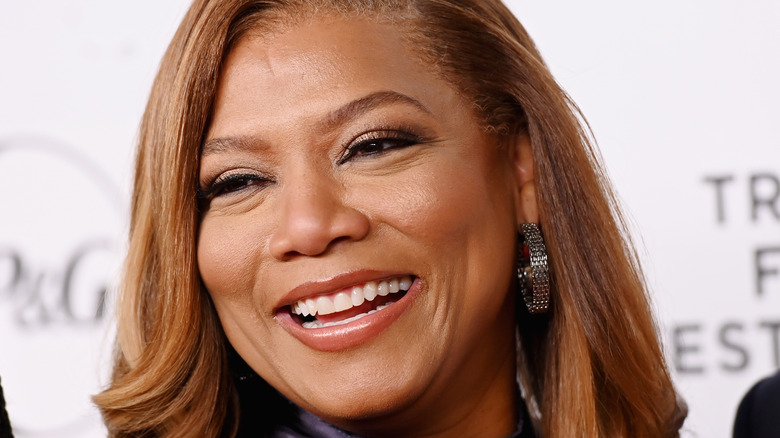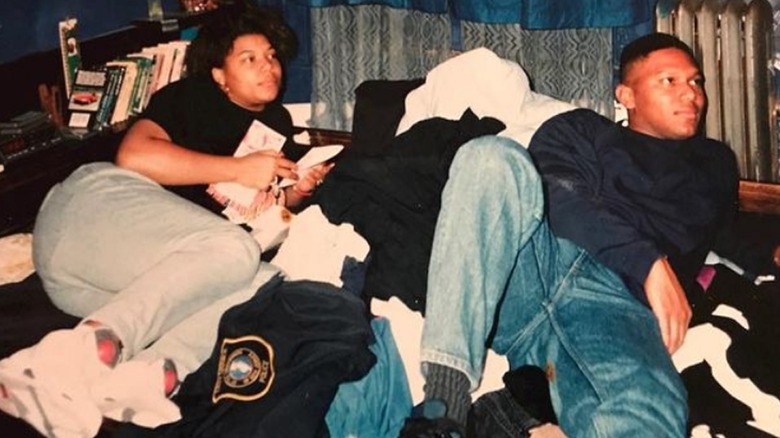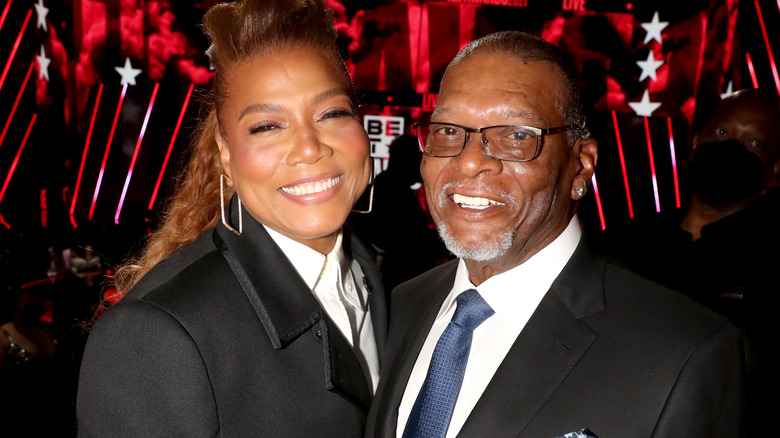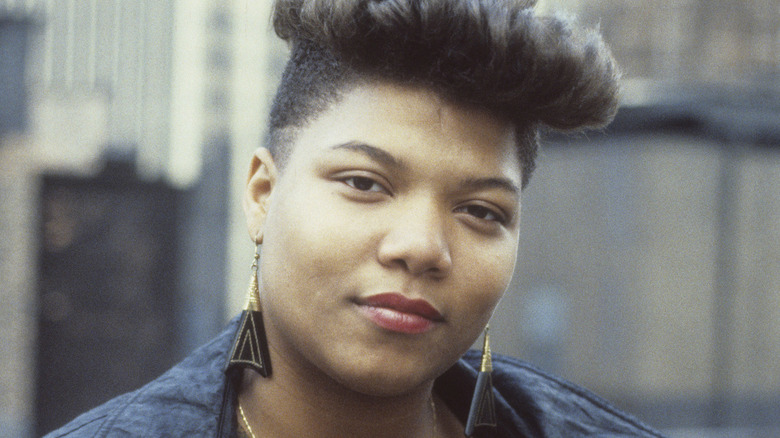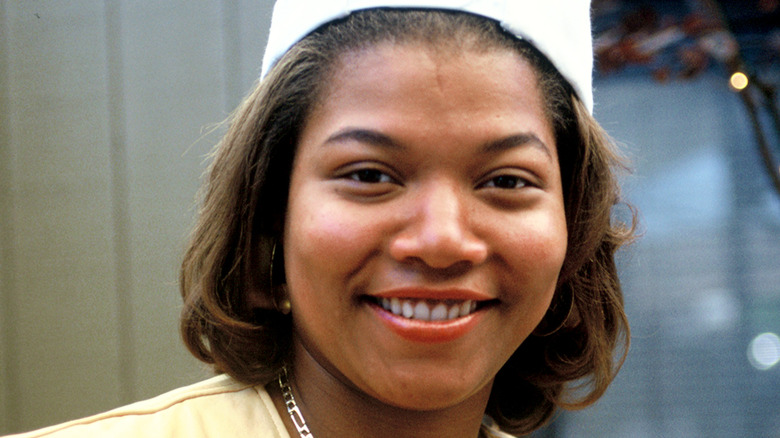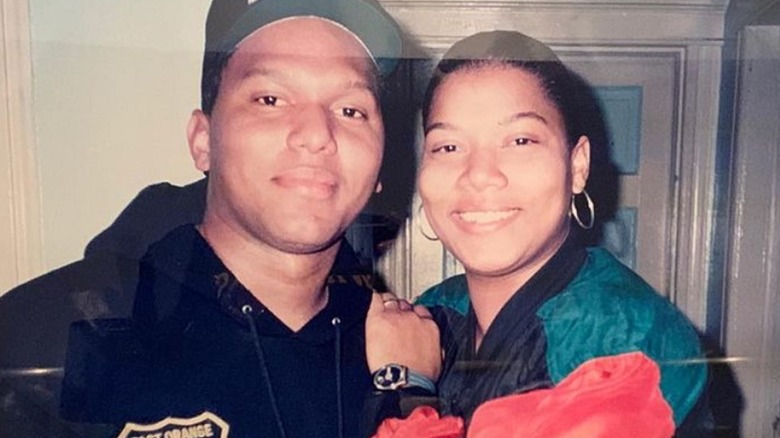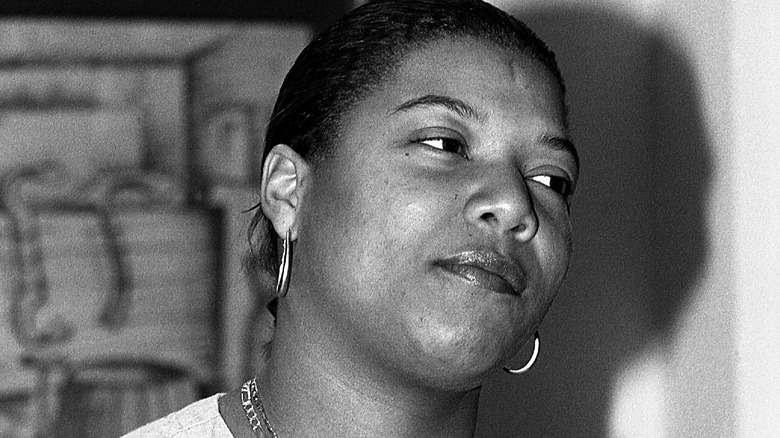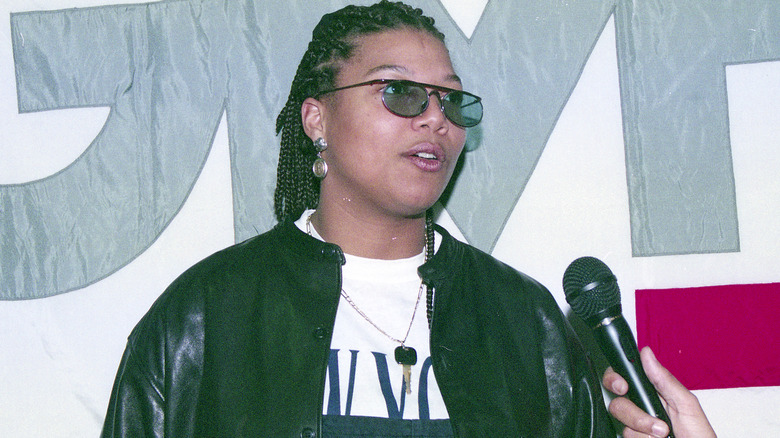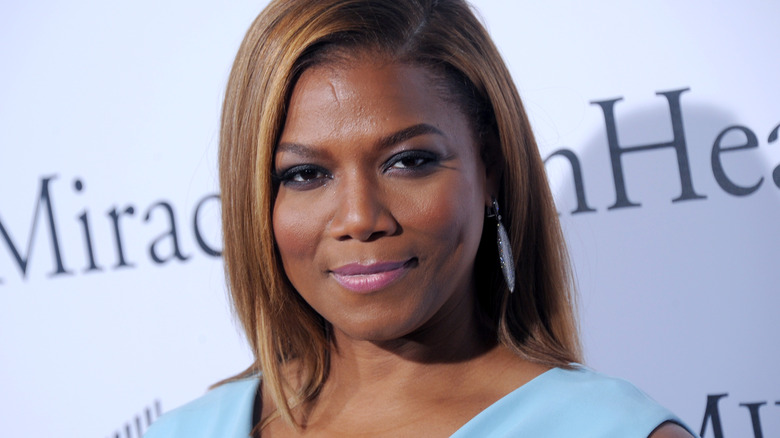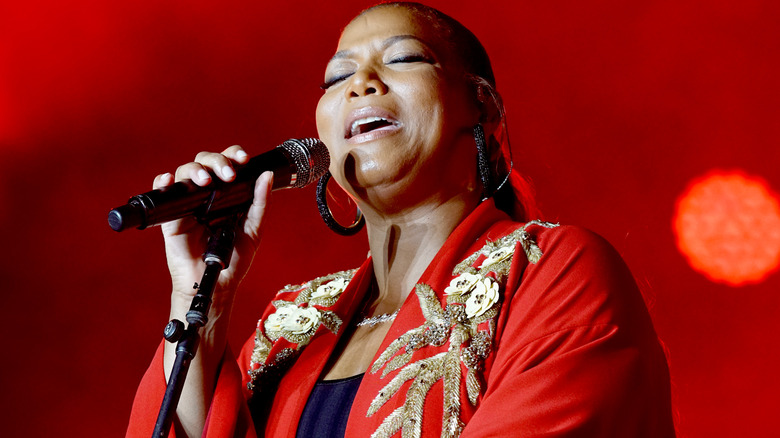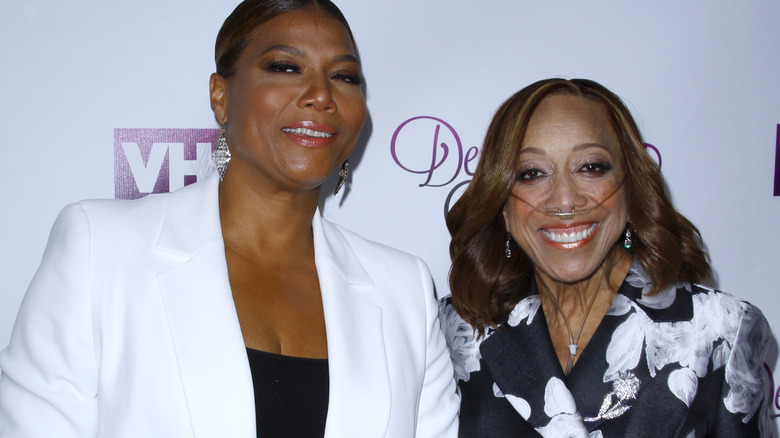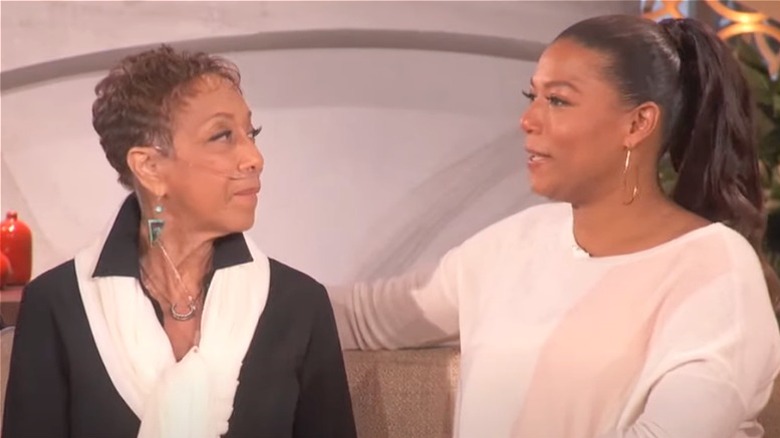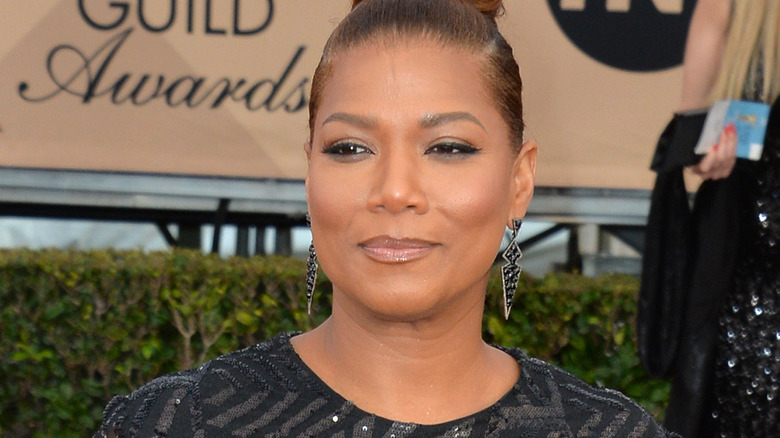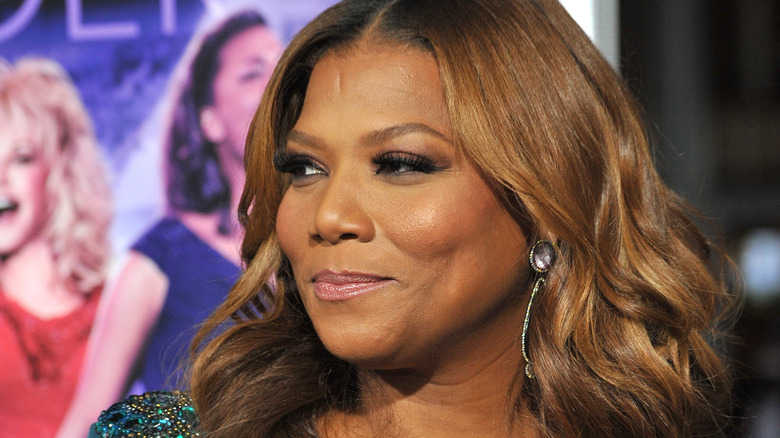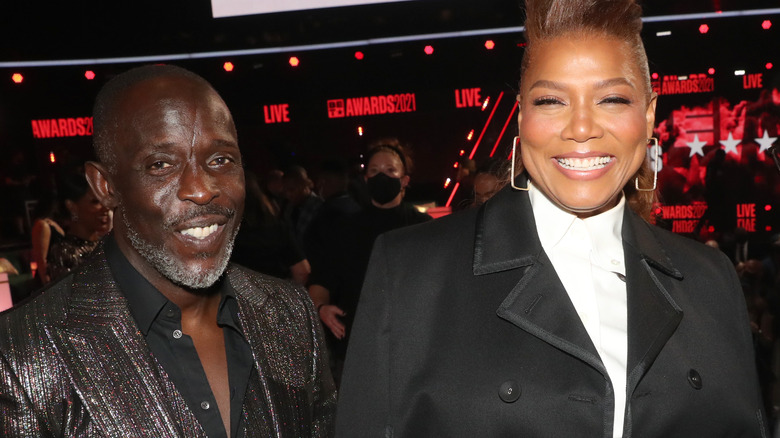Tragic Details About Queen Latifah
The following article includes mentions of child abuse, addiction, and mental health issues.
Queen Latifah is a triple threat: a rapper, actor, and television host, she is a multitalented performer who never shies away from speaking her truth. Breaking through hip-hop's glass ceiling to become a revered rapper with lyrics centered around gender inequality and racial injustice, Latifah garnered support from the iconic likes of De La Soul, with whom she collabed on her debut album.
Subsequently, she has earned a hefty net worth from her many pursuits — an estimated $70 million. Throughout it all, though, the rap pioneer has remained humble. Famed for her affable and jovial personality, Latifah always appears to greet others with a smile and her ever-present wit, seemingly unaffected by the trappings of an A-list lifestyle. But beneath that seemingly indefatigable veneer, Latifah has faced horrendous hardships.
Throughout the years, the rapper-turned-actor has endured numerous tragic events. From deeply upsetting bereavements to personal struggles, Latifah has, unfortunately, been through it all. Additionally, as a Black woman, she has faced immense prejudice, but uses her platform as a means to educate and uplift others. Latifah is strong-willed to say the least; despite her tragedies, she has always been able to come out through the darkness and live to tell the tale, inspiring others with stories of resistance and resilience. Get the Kleenex ready, because the Queen of Rap has had anything but a royal road to success. These are the tragic details about Queen Latifah.
Queen Latifah had a difficult childhood
Queen Latifah, born Dana Owens, was raised in the projects of New Jersey, and her family struggled to make ends meet. In her book "Put on Your Crown," she described the difficulties she faced as a result of being raised in poverty. "As a teenager growing up in a working class neighborhood in Newark, I also made some moves I'm not proud of," she revealed. "Money was tight, and I experimented with stuff that could have taken me right down into the gutter if I'd continued with it." She added that having a strong support network from her family "sustained me through the worst periods of my life."
As she explained to The New York Times, being raised in the projects wasn't all bad, but growing up in such an environment could potentially have drawn her down the wrong path. Subsequently, witnessing the pitfalls of poverty firsthand instilled Latifah with a strong sense of justice for the poor. "It became my goal to buy my parents houses," Latifah told Good Housekeeping, "and I did."
But it wasn't solely her family she wanted to help once she made it big. Her environment propelled her toward a desire to do good and help those in need. "I want to build a housing development, a big one, a real def one, and pay for people myself... Not for my friends; they can do it on their own. I'm talking about lower-income families," she told Interview magazine.
Queen Latifah's dad, a Vietnam veteran, struggled with drug use
As with many African-Americans, Queen Latifah's father, Lancelot Owens, was conscripted to the Vietnam War. According to NPR, 40% of those sent to fight in Vietnam were African-American, and racial discrimination was rife. As was sadly common for Vietnam veterans, Lancelot Owens struggled with mental health issues and substance misuse following his experiences in the war. "He wasn't there at some points, financially, when we could have used his help," she told The New York Times. "Vietnam had a lot to do with that, and he was dealing with a drug problem at that time. He was able to work through that stuff."
Latifah's father and her mom, Rita, divorced when she was 8. In an interview with The Virginian-Pilot, Latifah largely blamed the dissolution of her parents' marriage on Vietnam. "He was a big, hard-nosed cop. Vietnam did a few things to his life. Eventually he left the family," she reflected. Thereafter, Latifah and her brother were raised by their single mother.
Initially, Rita had to juggle domestic duties whilst working two jobs, but she eventually trained as a high school teacher. Latifah has credited her mom for ensuring her children thrived despite the grueling situation. As she told The New York Times in an earlier interview, "Any person who can take two kids basically without any support from their father and put them through Catholic school, because she felt they deserved a better education, is doing all right."
If you or anyone you know is struggling with addiction issues, help is available. Visit the Substance Abuse and Mental Health Services Administration website or contact SAMHSA's National Helpline at 1-800-662-HELP (4357).
The rapper was abused as a child
When Queen Latifah was a child, she was molested by a teenage babysitter. "He violated me," she told Essence. "I never told anybody; I just buried it as deeply as I could and kept people at an arm's distance. I never really let a person get too close to me. I could have been married years ago, but I had a commitment issue."
In a "Larry King Live" interview on CNN, she revealed that she was just 5 years old when the abuse occurred. As is common with survivors of child sexual abuse, Latifah was scared to tell her parents about what happened and thus kept it a secret until adulthood. She explained that the abuser was known to the family. "And I was scared to tell my father, because I'm like, my father's going to kill him, you know, and I'm like, I don't want to do that, but I had to," she revealed. "I had to, you know, let them know what I [had] gone through, so that they could understand maybe more of my mindset, and freed myself of that burden."
At the age of 22, Latifah was able to tell her parents. "My mother felt terrible. ... When I told my dad, he said nothing," she revealed to Essence. On reflection, Latifah told the outlet that she now realized why her dad remained silent upon hearing the news. "He's a man of action," she said.
If you or someone you know may be the victim of child abuse, please contact the Childhelp National Child Abuse Hotline at 1-800-4-A-Child (1-800-422-4453) or contact their live chat services.
Bullying and body negativity followed Queen Latifah
As Queen Latifah recounted on "The Ellen DeGeneres Show," both she and her brother were bullied at school. "When I was bullied, when my brother was bullied, as kids, we kind of kept it to ourselves," she told DeGeneres. "We tried to handle it on our own. And sometimes, it got out of control."
In particular, kids targeted Latifah's body shape. "I mean, I was always the biggest girl in my class... One thing I was self‑conscious about was my breasts. I thought they were so big," she told Us Weekly (via Mary Ellen Mark). "Then when I was 18 or 19, I dated somebody who just loved my body down, you know. Someone who just praised and adored my body constantly. That really turned me around."
Body negativity unfortunately followed Latifah into adulthood. She told Entertainment Tonight she had "been judged" for her body, causing her to frequently think about her weight. When Latifah embarked on an acting career, she was told to lose weight for roles due to Hollywood's arguably unrealistic body standards. "I can remember specifically doing 'Living Single' and the word came down that we needed to lose weight. ... If anything it angered me and disheartened me, but it really angered me," she revealed. "I said, 'We are what women look like, we're not going to lose weight for whoever's idea of what we're supposed to look like.'"
Lancelot Owens Jr., Queen Latifah's brother, died at 23
Queen Latifah's darkest moment came when her beloved brother, police officer Lancelot Owens Jr., died in an off-duty motorcycle accident in 1992. He was just 23. "My life was rocked to the core. ... And I felt guilty because I was angry at God," she told Good Housekeeping of the devastating loss. To make a tragic experience even more painful, Latifah had bought the very bike on which her brother died.
Opening up about the tragedy to The New York Times, Latifah acknowledged the lingering nature of grief. "I don't know if I ever recovered completely. ... You can't replace a person, especially someone with a big presence like my brother. We were best friends," she stated. Since her brother didn't live to see her success, Latifah revealed that the loss had left her with a sense of bitterness. "I felt like all these great things were happening, but I lost the most important thing to me," she said. "If that's the price I had to pay, I didn't want it."
For the sake of her family, and to honor her brother's legacy, she was able to slowly heal. Latifah came from a family of "fighters," she noted to Larry King on CNN. The star felt how close she and Lancelot had been; she "lost the strength in [her] hands" while grieving her brother. Latifah called him "an angel" and shared that others' prayers had helped her through the loss.
Queen Latifah struggled with depression and alcohol
As a result of her grief, Queen Latifah found herself in the midst of a mental health crisis. "The last four or five years of my life have been the hardest, after my brother died," she told Us Weekly in 1998 (via Mary Ellen Mark). "That screwed me up for real. I thought I was crazy. I felt out of touch with other people on the planet."
In a deep depression, she turned to alcohol, though this outlet provided little relief. "Every day I would be faded, like a painting that's just not vibrant, whose edges are dull," she told Good Housekeeping. "I wasn't living my full life." Eventually, she sought help for her depression and alcohol use, finding comfort in faith. "God just pulled my skirt a little bit and said, wake up, girl. Get it together, you know," she told Larry King on CNN.
Following her recovery, Latifah has raised awareness of mental illness and emphasized the importance of prioritizing mental wellbeing, particularly for Black women, who have historically faced discrimination and ignorance with regard to mental health. "I think it's very important that we, especially as Black women, don't hold back about being honest about what we're feeling — not just what we're feeling physically, but what we're feeling emotionally. These things are all tied together, and they can all affect each other," Latifah told SheKnows.
If you or anyone you know is struggling with addiction issues, help is available. Visit the Substance Abuse and Mental Health Services Administration website or contact SAMHSA's National Helpline at 1-800-662-HELP (4357).
If you or someone you know is struggling with mental health, please contact the Crisis Text Line by texting HOME to 741741, call the National Alliance on Mental Illness helpline at 1-800-950-NAMI (6264), or visit the National Institute of Mental Health website.
The rapper's boyfriend was shot
By the mid '90s, Queen Latifah was enjoying immense success due to her third album "Black Reign" and the sitcom "Living Single." But, in 1995, things took a devastating turn when Latifah and her friends were the victims of a traumatic carjacking. According to The New York Times, Latifah was in her BMW with her then-boyfriend and bodyguard, Sean, and her close friend, Lynn, when two armed men approached the vehicle and shot Sean in the stomach, critically wounding him. Good Housekeeping notes that Sean "nearly died in her arms." The men stole Latifah's car.
The Baltimore Sun highlighted Latifah's heroism, as she had hailed a cab and rushed Sean to the hospital, despite her trauma. "It was probably what saved his life," a detective told the outlet. "Here she was, a victim of a crime in a stressful situation, and she was cool, calm and collected."
In 1996, a tearful Latifah recalled the horrific incident in court, identifying a main perpetrator, Ricardo Rodriguez. "As I was getting out of the car I heard a gunshot, but I didn't panic because we weren't resisting or anything,″ Latifah recounted, per AP News. "He (pointing at Rodriguez) was standing there waiting to get in. I had a good look at his face, at least 10 seconds... I heard Lynn saying, 'He's hit! He's hit! Sean's hit!'... and blood was coming from his side." Rodriguez was found guilty and sentenced to 18 years for the violent crime he committed with Rashien Fortune, who shot Sean Moon.
Queen Latifah was affected by legal woes
From a young age, Queen Latifah found herself faced with numerous legal troubles. As a teenager, she briefly dealt drugs. "I did it a couple times to see if I could," she admitted to The New York Times. Then, she was paid $50 to have sex with a 40-year-old man when she was just 16.
In 1996, she was arrested on weapon and drug charges, per the Los Angeles Times. As the Virginian-Pilot notes, she was not prosecuted for possession of marijuana — though she was fined $810 for driving with no license and carrying a loaded weapon. Regarding the latter charge, she told Us Weekly (via Mary Ellen Mark), "Someone like me has got to have protection." It was also during this time that her friend and would-be collaborator, Tupac Shakur, was murdered. "This is a great American tragedy," she told the Spokesman-Review. "Not just for the Black community, for everybody. Everyone was magnetized by him."
In 2002, Latifah was arrested for "misdemeanor reckless driving," to which she pleaded no contest and avoided a DUI charge, per MTV. Opening up about her troubled past to Larry King on CNN, she explained that her second arrest spurred her to re-evaluate her life. "It was reckless driving," she stated. "I was not actually impaired, but I was over the legal limit. And it just made me think, that's not responsible. That's not the right thing to do. Wake up. Get it together, you know. I'm fine with checking myself... when I'm not doing the right thing."
If you or anyone you know is struggling with addiction issues, help is available. Visit the Substance Abuse and Mental Health Services Administration website or contact SAMHSA's National Helpline at 1-800-662-HELP (4357).
The rapper experienced sexism and racism throughout her life
"I learned early that I had to work harder than the white kids and harder than the boys," Queen Latifah told The New York Times. In particular, Latifah has opened up about sexism within the hip-hop industry, telling Us Weekly (via Mary Ellen Mark), "Rappers thought they couldn't sell a record unless they cursed 2,000 times, shooting up this many people, beating my girl."
During a talk at the Tribeca Film Festival (via Variety), Latifah described the hip-hop industry as "misogynistic." Despite this, she was able to make a name for herself in the biz and subsequently earned praise from male detractors. "It's about women feeling good about themselves from the inside out. ... When these gangster rappers praised my work, it drove home the fact that you can make a difference," she reflected. As ABC News highlights, Latifah's music had always been pivotal in challenging misogyny and standing up for Black lives.
Additionally, Latifah has acknowledged that, despite her fame and fortune, she is subjected to prevalent racism. "I experience racism every day," she told The New York Times. At VH1's Hip Hop Honors, she elaborated on this. "I don't care how much or things I have, or Puff has, or Missy has. If I go outside and try to hail a cab and he passes me for the white woman standing right there, that racism is still alive and kicking. And we have to change that," she said (via BBC).
If you or a loved one has experienced a hate crime, contact the VictimConnect Hotline by phone at 1-855-4-VICTIM or by chat for more information or assistance in locating services to help. If you or a loved one are in immediate danger, call 911.
Queen Latifah was her mom's caregiver
Queen Latifah was extremely close to her mother, Rita. "She's just like my best friend," she sweetly said on CNN's "Larry King Live." "There's nothing that I can't talk to her about." When Rita became ill with heart failure and scleroderma, a rare autoimmune disease, Latifah took on caregiver duties. Initially, she was frightened when her mom received the latter diagnosis. "That was terrifying because now we had to figure out, 'what does it mean to have this autoimmune disease?' I had never heard of scleroderma before. This was a shock to her and it was a shock to me," she told Good Housekeeping.
According to AARP, Latifah first took on caregiver duties in 2004, after her mom fell ill while working as a school teacher. Latifah explained to the organization that she wanted to make her mother, who had a "defibrillator implanted in her chest," as comfortable as possible, cooking her healthy meals and managing her medication.
Speaking with People, Latifah opened up about the difficulties of being a caregiver, but also praised her mom's resilience in the face of overwhelming adversity: "I watched her come through so many things, ups and downs, hospitalizations... and bounce back and still maintain this sense of humor, and love and drive and will." The actor shared that her role was "just like being a parent, like some things really don't matter. All the kind of frivolous things sort of fall to the side because there's something way more important than all that."
The tragic death of Queen Latifah's mother
After 14 years of ill health, Queen Latifah's mother died in 2018, aged 69. "It is with a heavy heart that I share the news my mother, Rita Owens passed away today," she told People. "Anyone that has ever met her knows what a bright light she was on this earth. ... She had struggled with a heart condition for many years and her battle is now over. I am heartbroken but know she is at peace."
Discussing the illness that took her mom's life, she explained to"Today" (via NBC News) that scleroderma was "something that affected my mom who was otherwise a totally healthy person. It kind of came out of nowhere." Despite her pain at the devastating loss, Latifah told Good Housekeeping that her mother remains with her, living on through the values she instilled. "I learned so much from my mom about being strong, and even though she's not with me, I carry that strength with me every day," she mused.
Reflecting on everything her mother gave her, she told People, "When everything was too heavy for me to bear, I would disappear and call my mother," who shared her "calmness" with Latifah on those calls. Additionally, Latifah said that she shares an otherworldly bond with her mom, believing that "She still talks to me. I know it's going to sound crazy, but I get little signs. Lights will blink. Things will flicker."
Queen Latifah witnessed domestic violence in her family
Queen Latifah has long been a champion of women's rights. As Consequence highlights, her 1993 single "U.N.I.T.Y." was a pivotal anthem in addressing domestic violence at a time when such issues were scarcely discussed, particularly within hip-hop. As they have been ignored, "countless women [have suffered] in silence so as not to cause more damage to themselves or the people around them," the outlet argues. "With 'U.N.I.T.Y.,' Queen Latifah... gave women the courage to speak out about the injustices they endured on a daily basis." But at the time, fans had no idea that the profound lyrics were steeped in a tragic reality.
On her eponymous show, Queen Latifah opened up about a very personal experience with domestic violence. Sadly, she witnessed her cousin being abused for years by her cousin's partner. "Twenty-one years ago I wrote the song 'U.N.I.T.Y.' about disrespect and violence towards women," she began. "Y'all remember that song, right? That entire second verse of that song was written about my cousin who was in an abusive relationship with her husband." While her cousin was able to eventually escape the relationship with help from Latifah's family, Latifah acknowledged that, for many women, escape isn't so easy. "I wish the message in that song wasn't even relevant today," she lamented. "But it is."
In addition to empowering women and giving them a voice through her music, Queen Latifah launched the Queen Collective with Tribeca Film Festival and Proctor & Gamble. The initiative is a program for female, multicultural film directors, who are given support "to tell their stories" through their art.
If you or someone you know is dealing with domestic abuse, you can call the National Domestic Violence Hotline at 1−800−799−7233. You can also find more information, resources, and support at their website.
There are claims that Queen Latifah's dog died horrifically
In 2021, Queen Latifah was faced with another horrific tragedy when her beloved dog was apparently found "mauled..to death." According to TMZ, Latifah sought the help of "Dog Whisperer" Cesar Millan, bringing her 2 pups to his psychology class. However, things allegedly took a tragic turn when one of her dogs was apparently "attacked and killed" by the canine expert's pit bull.
Lidia Matiss, who claims she was violently attacked by Millan's pit bull, filed a lawsuit against the "Dog Whisperer," detailing the alleged attack against Latifah's pup. According to Matiss, Millan attempted to cover up Latifah's dog's death by urging "his staff to tell Queen Latifah the dog was hit and killed by a car." The lawsuit alleges a "history of extreme violence" from Millan's dog.
Latifah and Millan previously appeared to share a close friendship. In 2014, he appeared on "The Queen Latifah Show" to discuss doggy matters. In 2018, she expressed her joy at enrolling her new furbabies in training programs with Millan. "Had my first training session for my new babies with @cesarmillan! Already learning So much!!!", she wrote in a Tweet that seems especially chilling in light of the accusations. Subsequently, her dog's death, allegedly at the hands of the very person whose expertise she sought, is particularly tragic. Per People, Millan denies that his dog killed Latifah's pet, branding the accusation "a blatant lie."
Queen Latifah lost one of her dearest friends
One of Queen Latifah's closest friends was acclaimed actor Michael K. Williams, famed for his role as Omar Little on "The Wire." Williams gushed about their friendship in 2018. "I love her, man," he told Entertainment Weekly, before crediting Latifah with uplifting and encouraging him to pursue his dreams. "She was the first thing to inspire me. She was the first person that I saw in my life that made [success] tangible."
During Williams' appearance on "The Queen Latifah Show," the host revealed that the pair had been friends since she was 16. In what would be Williams' final stint on the show, the longtime pals reminisced about old times, with Williams paying a warm tribute to Latifah. "Dana never took no mess... always strong-minded, strong-willed, and she could pack a punch," he joked. "But loving, caring, and just sincere."
Tragically, Latifah lost her buddy in 2021. Aged just 54, Williams was found dead in his Brooklyn apartment, per the New York Post. The actor died from an apparent drug overdose. Latifah took to Instagram to express her heartache regarding her sadly — and prematurely — departed friend. "Your Heart has always been So Big," she wrote as part of a touching tribute. "Thank you for sharing it with so many. The world will miss your talent, but I will miss your silly laugh! I Love You Mike and I will Always be proud of you."
If you or anyone you know is struggling with addiction issues, help is available. Visit the Substance Abuse and Mental Health Services Administration website or contact SAMHSA's National Helpline at 1-800-662-HELP (4357).

